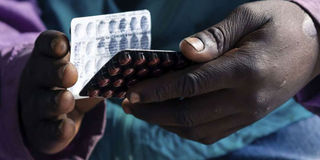What to consider for Covid-19 vaccine if you have cancer, heart disease, diabetes or respiratory ailments

What you need to know:
- People living with underlying health conditions are highly urged to get the vaccine even though their immunity may be compromised
The Covid-19 pandemic has affected everyone in many ways.
You have probably lost someone really close to you because of Covid-19; and people are still dying.
Because of its mode of transmission, it has been really hard to contain the disease.
So, vaccine roll-out will be a significant milestone especially for people with underlying medical conditions being highly affected.
However, there have been a lot of questions surrounding the issuance of vaccine from this vulnerable group of people. Frequently asked questions have been tackled below:
Underlying medical conditions most affected
Having a medical condition puts you at a higher risk of getting severe Covid-19 symptoms.
This is because of the compromised immunity caused by underlying health conditions.
Individuals with a compromised immune system are more susceptible to infections and their body will not be able to fight Covid-19 as quickly.
People with cancer, heart disease, diabetes and chronic respiratory ailments are at risk of severe effects of Covid-19. Those with respiratory chronic illnesses are the most affected.
So, should you get the Covid-19 vaccine?
Yes. People living with underlying health conditions are urged to get the vaccine. Although their immunity may be compromised because, the Covid-19 vaccine will save lives where complications arise.
Side effects
The Covid-19 vaccine does not have any common or long-lasting side effects and is safe for most adults.
It may however cause fever, soreness at the injection site and mild muscle pain as a temporary reaction.
Talk to your physician or healthcare provider in the event you experience something out of the ordinary.
Under medication?
It is advisable to consult the doctor for advice. Your family physician will be able to provide a comprehensive assessment of your medical condition and advise on what steps might need to be taken in terms of vaccination against COVID.
Patients under chemotherapy
Specialists recommend receiving the Covid-19 vaccine both before and after extensive chemotherapy treatments such as those given for acute leukemia.
However, because of the potential of fever within 24-48 hours of administration, it is preferable to receive vaccinations when your white blood cell counts are not expected to be low.
For patients receiving immunotherapy: If treatment for cancer includes immunotherapy, it is generally ok to receive a vaccine and continue with the therapy.
How is the vaccine administered?
Most vaccines are given as two injections. The first dose provides adequate protection after a single jab, while the second completes the course and offers better long-term protection.
Where do you get the vaccine?
This is determined by your geographical location. However, most health facilities are offering the vaccines.
Some places have medical camps issuing mass vaccination. Your personal doctor can direct you as well. Ensure it is a reliable facility that issues the vaccine.
How much does it cost?
The Covid-19 vaccine should be issued for free. Yes, it is free for people with underlying health issues too. You can even book for vaccination at your local pharmacy.
It is important to note that people with underlying health conditions are a priority for vaccination.
Being the most susceptible, chances of getting severely affected are minimised.
If you are not sure whether to get the vaccine, then it is best if you see your doctor. As an alternative option, consult with the nearest physician.


